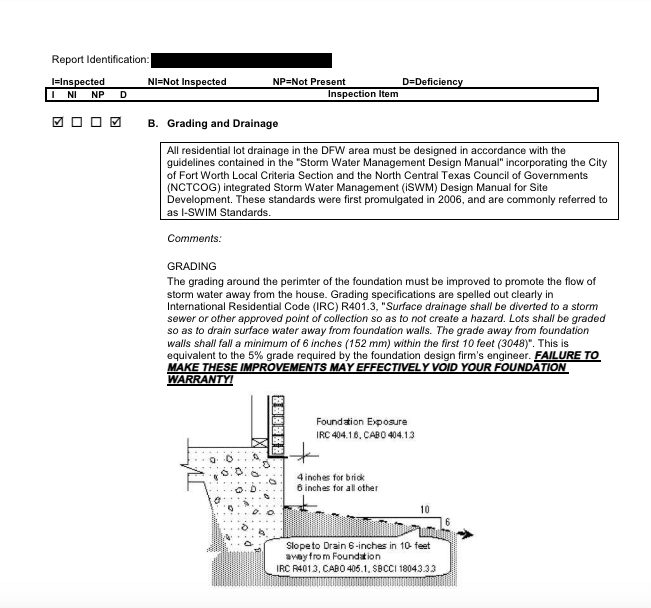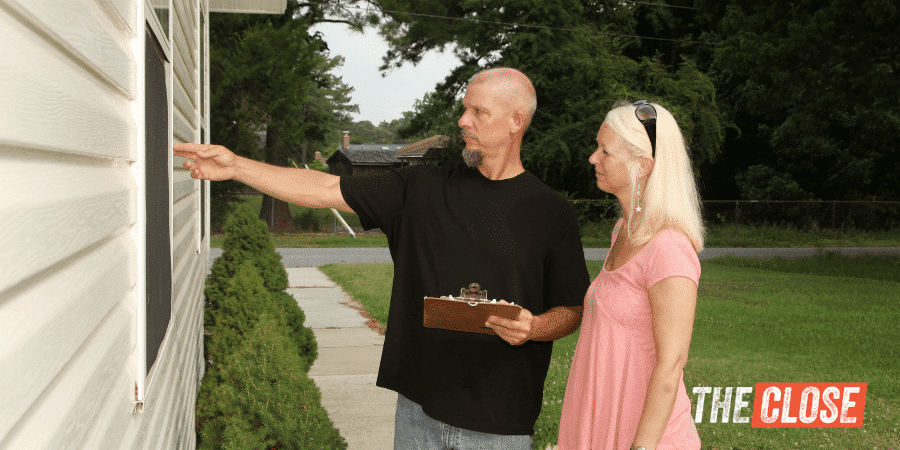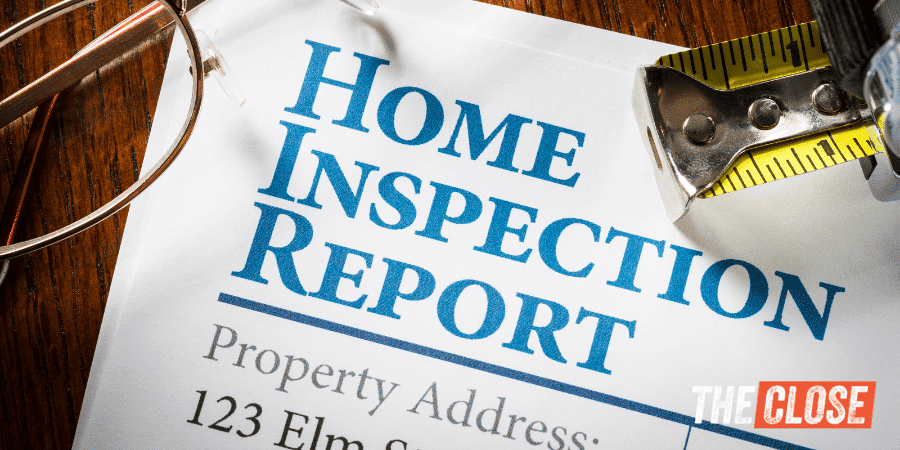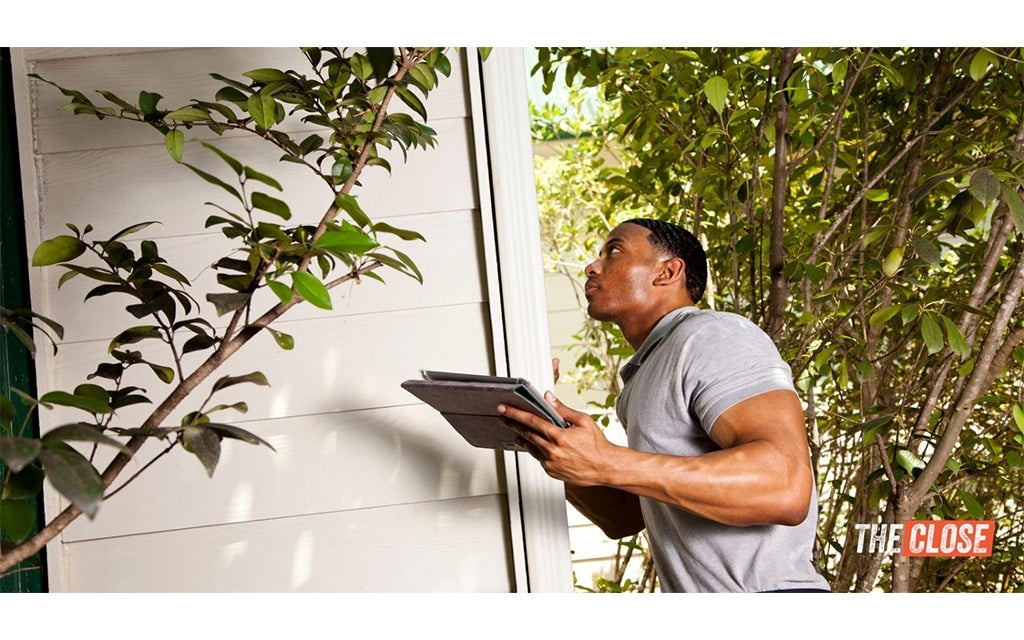Home inspections can be stressful for everyone involved, especially when unexpected issues put a deal at risk. Use this list to help your clients ask the right questions, get clearer answers from inspectors, and move through the process with greater confidence.
Questions to ask before the home inspection
Choosing a quality home inspector is a vital step in any thorough house hunting checklist. Use these questions to help your clients evaluate inspectors before the appointment.

1. What are your credentials?
When hiring an inspector, asking about credentials should be one of your client’s first priorities. A home inspector should be licensed and belong to an organization like the International Association of Certified Home Inspectors (InterNACHI) or the American Society of Home Inspectors (ASHI). These organizations provide search tools to verify licensing status and find qualified inspectors.
Not all states require home inspectors to be licensed, but choosing one with credentials adds professionalism and peace of mind.
If you’re curious about the home inspector licensing process, read more in our guide on how to become a home inspector.
2. Are you bonded and insured?
When a company (or individual) says they are bonded and insured, it means they carry proper insurance for their business, and their work is protected. Bonding adds a second layer of protection for professionals working inside other people’s property.
While being bonded or insured isn’t required in every state, it’s best to work with an inspector who carries both. If anything happens to a homeowner’s personal property during the inspection, the bond and insurance protect everyone involved.
3. How do you stay current with the industry?
The home inspection industry shifts along with construction standards and real estate laws, so it’s essential to work with someone who stays current. Ask inspectors how they maintain their knowledge. A professional who values continuing education is more likely to be thorough and up to date on what matters most to your clients.
4. Can I attend the home inspection?
This is one of the most important questions to ask. Since the buyer pays for the inspection, they have the right to accompany the inspector throughout the process. Most inspectors expect this, though some may have safety recommendations, such as not having anyone accompany them into the attic, crawlspace, or onto the roof.
5. What type of inspection services do you provide?
Some inspectors specialize in specific systems. For example, some may also be general contractors or roofers and go the extra mile (literally) by walking the roof instead of just viewing it from the ground.
Inspectors with additional experience in related fields or who provide extra services may charge more, but the benefits can be worth it. If there are concerns about specific areas of a home, make sure the inspector has experience with those systems.
6. How much experience do you have?
There’s nothing wrong with hiring an inspector who is new to the field. However, in that case, it’s wise to ask for references or confirm whether they have experience in a related field. A background in construction, electrical, plumbing, HVAC, or roofing can often offset limited home inspection experience.
Even a licensed contractor or builder without a formal home inspection license may be well-qualified, depending on local regulations and other factors.
7. How much will the home inspection cost?
Since the homebuyer pays for the inspection, you’ll want to clarify the cost and everything it includes. The average cost of a home inspection across the US is about $300 to $500, depending on individual inspectors, the property type, and the location of your market.
8. Do you reinspect?
Sometimes an inspector may need to return for a second inspection. For example, if wood rot is repaired or a roof is replaced after the initial report. Reinspections are often needed to move forward with insurance or financing.
Some inspectors return for a reduced rate, while others charge a full second fee. Even if a reinspection isn’t needed, it’s helpful to set expectations in advance.
9. What type of report will you deliver?
Some home inspectors provide detailed reports with lots of photos, which is ideal. Pictures help clients visualize exactly what and where the issues are — and make future maintenance easier. If a report doesn’t include photos or diagrams, it can be harder to understand what needs to be addressed.
Look for an inspector who delivers a thorough, written inspection report with visuals.

10. How long will it take to receive the inspection report?
When a home is under contract, buyers have a limited window to complete the inspection and make decisions. If the inspector delays delivery, that cuts into the time your client has to review and respond. Most inspectors provide reports within 24 hours, but it’s smart to confirm that upfront.
11. Will you answer questions after the inspection?
Although knowing what to ask a home inspector before the appointment is helpful, homebuyers and agents often have questions after the inspection. Communicate clearly with potential inspectors about their availability to answer follow-up questions. During your interview, look for someone who is a good communicator and can go over the report in detail, answering all questions in layperson’s terms.
12. Are there any areas you don’t inspect?
Some inspectors have rigid rules about what they do and do not do during an inspection. For example, there are those who only inspect easily accessible areas and do not move furniture to access certain areas.
Additionally, some may not inspect the attic or spaces that require crawling or special gear. In many cases, this isn’t necessary, but it’s ideal to find someone willing to get their hands dirty to thoroughly understand the home’s condition.
Questions to ask during a home inspection
Ideally, homebuyers and their agent(s) should accompany the inspector during the appointment. This is a great opportunity to gather insights about the home’s systems, condition, and long-term maintenance. A good inspector can be a wealth of information — there are no bad questions here!

13. I don’t know what that means. Can you clarify?
It’s almost guaranteed that the inspector will point out something unfamiliar to your client — or even to you. These are some of the most valuable questions to ask because they give the inspector a chance to share deeper knowledge.
If something about the electrical system, HVAC, appliances, or structural components isn’t clear, encourage your client to ask for clarification. A good inspector should be able to explain issues in plain language.
14. How’s the condition of the __?
Even though a professional inspector will likely walk through all major systems, it’s still smart to ask for a direct assessment of each. Make sure your client understands the condition of key areas like:
15. Are there any mold concerns?
Mold isn’t always visible. It could be hidden behind walls or beneath the flooring. Some inspectors test air quality for mold, while others don’t.
If mold testing isn’t included, ask whether they can refer a specialist. Catching this early can prevent serious issues later on!
16. Any tips on maintaining [insert system]?
Many homebuyers aren’t familiar with the systems in a house. These questions are useful both during and after the inspection to help them plan long-term maintenance and avoid emergencies.
Ask for advice on maintaining systems like:
- HVAC systems
- Water heater
- Appliances (refrigerator, dishwasher, washer, dryer, etc.)
- Irrigation systems
- Plumbing
- Electrical
17. Do you see any major red flags?
You’ll pick up plenty of information as you work through the inspection. However, keep this question toward the end of the process. This is when the inspector will have a more thorough understanding of all the home’s systems and the overall condition.
18. Would you buy this house?
This is a fantastic, straightforward question to ask a home inspector. Depending on their answer, you and your clients can get more details on the inspector’s overall confidence in the home’s value. The response to this question must be based on the inspector’s inspection, not aesthetics or home type. Would they buy the home in its current condition?
Questions to ask after the home inspection
Once the inspection is complete, the next step is helping your clients understand what the findings mean and how to move forward with confidence. These questions can help clarify costs, next steps, and ongoing maintenance.

19. What are the costliest repairs needed?
This question will be crucial to buyers because it will determine if a property is too risky or expensive. Depending on the buyers’ overall budget, there may be a way to negotiate with the sellers on certain repairs. For realtors, this is one of the most important times to represent your client’s best interests and work with the seller’s agent to reach an agreement that fits both parties.
20. Who do you recommend for repairs?
Since the home inspection industry is related to construction and real estate, a good inspector should have firsthand experience with plenty of contractors and specialists. Plus, many home inspectors own their businesses and know how valuable referrals are to other homebuyers and other business owners.
21. How can I best maintain my new home?
After closing, most buyers are eager to keep their home in great condition, but many aren’t sure where to start. Ask the inspector for basic maintenance tips your client can follow year-round, especially for systems like HVAC, plumbing, or appliances.
This is also a great chance for agents to add value: consider creating a home maintenance checklist or sending a post-inspection resource email to your clients. It positions you as a long-term resource — and increases your chances for referrals and repeat business.
What to do with your inspection report
Once the inspection is complete and the report is in hand, your job as an agent is far from over. This is where you can shine, by helping clients interpret the findings and take thoughtful next steps:
Help your clients take smart action with these simple next steps:
- Prioritize by urgency: Focus on safety issues, major systems (like HVAC, roof, foundation), and minor/cosmetic items, in that order.
- Get real repair estimates: Encourage clients to consult contractors for accurate pricing, especially on big-ticket repairs.
- Negotiate with strategy: Partner with your clients to decide whether to request repairs, credits, or a price reduction.
- Plan long-term: The report can double as a future maintenance guide — even minor fixes matter.
- Keep calm: No home is perfect. Help clients see the difference between deal-breakers and manageable repairs.
Home inspection questions to expect as a real estate agent
That wraps up the most essential questions homebuyers should ask home inspectors before, during, and after the appointment.
But what about you, the real estate professional? Whether you’re representing buyers or sellers, inspections come with their own set of questions aimed at you. The next section covers the most common ones — and how to respond with confidence.

1. Why do I need a home inspection?
Although there are cases when agents make an offer stand out by waiving an inspection, lenders often require it for loan approval. Even for cash buyers, a smart agent will recommend that buyers get one for different reasons.
For sellers, a pre-listing inspection can help identify problems early, making it easier to price, position, and market the property effectively. It also helps prevent surprises that could derail a deal later.
Even new construction benefits from a third-party inspection. Major issues like foundation cracks, termite damage, or a deteriorating roof can go unnoticed without a professional assessment.
-
Related article: The Ultimate Real Estate Listing Marketing Plan (PDF Checklist)
2. What does a home inspection include?
A home inspection is designed to assess the safety and quality of a home by inspecting all of the accessible areas of the home. Typically, a home inspection covers all the major points in the home, including the following:
- Electrical
- Plumbing
- Heating
- Ventilation
- HVAC systems
- Foundation or structural components
- Roof and exterior conditions
- Insulation
- Windows
3. How does a home inspection affect my loan?
Technically, a home inspection isn’t required for cash buyers. But for financed purchases, most lenders do require both an inspection and an appraisal. The inspection identifies potential property issues, while the appraisal ensures the home’s value aligns with the loan amount.
In short, banks want to know the property is structurally sound and worth the investment they’re making.
4. What’s the difference between a home inspection and an appraisal?
Homebuyers often confuse these two processes. A home inspection evaluates a property’s condition, including electrical, plumbing, foundation, and roofing systems. An appraisal, on the other hand, assesses the home’s market value.
Inspectors focus on function and safety. Appraisers look at cosmetic finishes, location, and comparable sales. While both involve property reviews, they serve entirely different purposes in the transaction.
5. What will the inspector find?
Even in a clean inspection, there’s almost always a list of repairs. However, only some items will be deal-breakers. The inspector will identify major issues — such as an aging HVAC system, active leaks, or a deteriorating roof — that should be addressed during negotiations.
Minor items may simply become part of the new homeowner’s maintenance plan. As the agent, you’ll help interpret the findings, guide your client through the next
Frequently asked questions (FAQs)
What are three questions you may ask the inspector?
Some of the most important questions to ask during a home inspection focus on the condition of the home’s major systems, such as:
- HVAC
- Plumbing
- Electrical
Other smart follow-ups include:
- What are the costliest repairs needed?
- Would you buy this house?
- Which repairs are safety hazards?
What will a home inspector typically evaluate?
A home inspector will evaluate all systems and features of the house, including the following:
- Electrical system
- Plumbing
- HVAC
- Ventilation
- Foundation issues
- Insulation
- Windows
- Gutters/drainage
- Exterior condition (including the roof)
- Checking for mold
- Evaluation of termite damage
What should I look for during a home inspection?
During the inspection, focus on the condition of the home’s most critical systems: the roof, plumbing, electrical, foundation, and hot water heater. Also, observe the inspector’s thoroughness: are they checking all accessible areas and clearly explaining what they find?
A detailed inspection should leave your client with a clear picture of what needs attention now and what may need maintenance later.
Do I need a specialist if the inspector finds something serious?
Yes. Home inspectors are generalists — they identify potential issues but don’t perform repairs. If the inspector finds problems with the roof, foundation, plumbing, or electrical systems, your client should follow up with a licensed contractor or specialist for a full evaluation and estimate.
Can a home fail an inspection?
Technically, no. A home inspection doesn’t have a pass/fail grade. The report simply outlines the condition of the property. It’s up to the buyer and their agent to decide whether the findings are acceptable, negotiable, or deal-breaking.
Should buyers attend the home inspection?
Absolutely. Attending the inspection helps buyers better understand the home’s condition and provides them with the opportunity to ask questions in real time. It’s one of the best ways to turn the inspection into an educational opportunity, not just a checklist!









